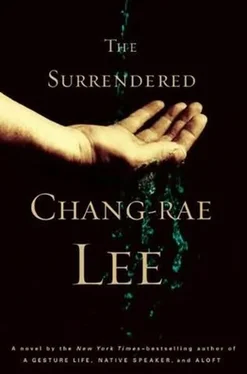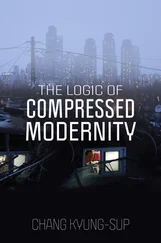He unconsciously brought his fingers to his nose now, as was his habit ever since those days, and while they stunk for sure he couldn’t make out any of that unsavory, fecund redolence. And yet, something else had been revived. Was it the smell of smoke, of ash? He had long thought that was finally dissipated, gone for good, but then he was someone who was too often mistaken.
Yongin, South Korea, 1953
HECTOR BEGAN WORKING at the orphanage soon after the armistice, in June. He had been given his separation from the army for “a pattern of discreditable conduct” that included charges of chronic fighting, trading in contraband, and assaulting an officer. The fighting he was certainly guilty of, but the other charges were debatable, the black-market dealing a case of his being an unwitting courier for a friend, and then the one of striking an officer outside a bar in Itaewon completely bogus; there was a wild scrum of drunken servicemen and Hector pushed a lieutenant who was kicking an already passed-out grunt and the officer tripped back over someone else, his face clanging against the rim of an empty fuel drum. The officer was badly gashed and nearly lost his ear, and it was only due to the resolve of his idealistic army lawyer that Hector received a bad-conduct discharge and not six months in the brig.
Hector decided to look up a Korean preacher he knew, a Reverend Hong, who eventually arranged his papers so that he could stay on in the country. Hong ran an orphanage an hour’s drive south of Seoul and had once offered Hector a job there as a general handyman. They’d met, by chance, when Hector had defended him, coming upon the reverend being mugged in an alleyway of Seoul. Some street kids had beaten him with their fists and bamboo sticks, one of them trying to strip him of his briefcase, his billfold, even his shoes. Hector had to punch the biggest kid when he waved a knife before they would all scatter. After the reverend gathered and composed himself he asked if Hector wanted a job, which Hector immediately declined. But after the discharge Hector remembered the orphanage’s name, New Hope. He hitched a ride part of the way but walked the last half with just a satchel of his things and the clothes on his back and, of course, a starving girl named June marking him in the near distance like a dusty little moon. They had arrived at the orphanage like this, in tandem but separate, and soon enough both found a place there. They would have likely remained in their respective orbits and never drawn closer to each other had an American couple not arrived in late summer, a reverend and his wife.
When the Tanners first arrived, Hector was out gathering firewood with a crew of boys. He liked working at the orphanage, being in the clean, sweet air of the valley and fixing and making things with his hands. The grounds of the orphanage were set on a low and wide plateau amid steeper, higher hills and mountains that ranged across much of the country. The land was a lesson in hills, one right after the next. The orphanage itself comprised two old, long dormitory buildings (a former stable, a granary), a cottage, and a new building that had been built by an army unit that held a kitchen and classrooms that doubled as mess halls. The structures, laid out in an L, bounded a dirt field where the children played soccer and other games. Reverend Hong played with them all the time, but Hector knew only American football and always declined. In truth, he tried not to spend much time with the orphanage children, even though he enjoyed their company; he admired these children especially but he was wary of getting to know any one of them too well, to get close to them, to be relied upon as a friend. By definition they were hard-luck cases (and often worse) and in the time that he was in Korea he had witnessed enough acute examples of wartime suffering and misery on the roadside and in the villages and in the red-lanterned parlors that he couldn’t help but see cast over them an altogether different shadow, with the conflict being over: for who could bear the idea of any misfortune befalling them now?
The hills of the valley had been nearly cleared during the war for fire fuel, or else blasted clean, and once a week he led a group of boys to collect loose kindling and branches. Each time they had to go farther to get the same load. That day was seasonably hot but there was a drying breeze coming from the north and the boys were especially playful and energetic as they combed the hillsides. As usual there was little wood to be gathered to start but before hiking the steep hill to the next valley he let the older ones organize a game of Capture the Flag. They had enough wood back at the orphanage anyway, not even counting a recent shipment of coal, and as winter was still a long way off, it didn’t much matter what they gathered now.
Hector watched them for a while, and when the boys of one side kept losing and cried for him to help them, he finally joined in. To be fair to the other team, he carried the smallest boy, Min, on his back and ran about that way. Min was not the youngest but he was undersized from severe malnourishment during the war. Reverend Hong had found him sitting slumped in an alleyway of Seoul, barely conscious, near skeletal, pocked with insect stings and rat bites. With a month of regular eating he was growing again, but the other boys still made fun of him for being tiny and weak, and then because he was smart. With Min on his back, Hector ran easily, and after a few furious end rushes they won, Min shouting and waving the rag that was the other team’s flag. Hector made sure to win the next game again, the boys crying foul, Min chattering at them from his perch. A small, rocky stream cut through the ground of their play, and afterward they all knelt and drank from it, splashing the cool water on their necks and faces, the boys recounting how the game had gone, teasing and taunting one another with grown-up bravado and bluster. It could have been any summer afternoon back in Ilion, and for a moment Hector forgot who they were and where he was, until he noticed Min idly upturning stones along the bank. The boy was hunting for insects and worms, and when he caught a large water bug in his fingers he seemed to inspect it, not with curiosity but a long, knowing gaze. Hector watched as he brought it to his lips but then stopped just short, quelling a certain habit. Hector called them all then and got them up and moving again.
In the next valley they found a stand of trees tucked back in a shady ravine and Hector was glad that he’d brought along an ax. He set the boys to gathering kindling while he worked on a dead tree. Its thick trunk had been cleaved by lightning. He chopped at it steadily but the ax head was dulled and whenever he struck a dense spot or knot it jumped back at him violently. The tree still had most of its limbs and as he got closer to felling it he kept ordering the boys to move back, which they did, but soon enough they had gathered around him again and were begging for a try. He let some of the older boys take a few swings each and then he took up the ax again and worked steadily, gradually losing himself in the exertion, in the rhythm, the muted chuck s of the blows, and by the time he was near done he was sweating like a draft horse, his hands raw and abraded but alive. Finally he dropped the ax and pushed; the tree groaned once and then cracked and fell in a sudden threshing of dry leaves and dust. The boys cheered him and themselves, clambering upon it as if they’d brought down big game, raising their arms in triumph, with even Hector chiming in.
No one noticed that Min had picked up the ax and was swinging at a root; Min gave it a couple of good hits, but on the third try he slipped and lost his balance and missed and the blade came down on his foot. He screamed as if he were dying. Hector was immediately on him, his own heart bolting, but he couldn’t get Min to move: the heavy blade had gone straight through his foot and was stuck in the wide root below. Hector took the boy’s face in his hands and told him he would count to three but immediately pinched the boy’s ear as hard as he could while pulling out the ax head. Min cried out once more and fainted. The worn canvas sneaker welled instantly with blood. Hector took off his T-shirt but was afraid of removing the sneaker and so bound it all up as tightly as he could. He put Min on his back and ran, trying not to jostle the boy too much, ordering all the boys to sprint ahead and alert Reverend Hong to what had happened. But they had marched a half hour here and he knew he would have hills to cross on the return. Soon Min was awake again and moaning and crying softly, and to his own surprise Hector began singing the chorus of a song that his mother often sang to try to put him to sleep, an Irish famine-era ballad called “The Fields of Athenry”:
Читать дальше











